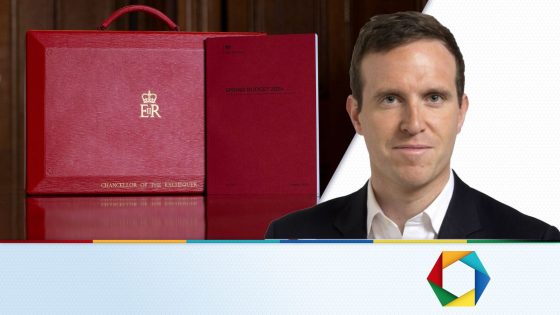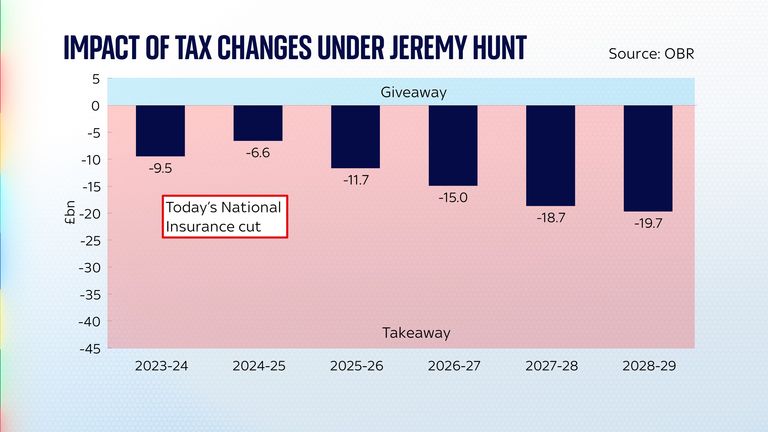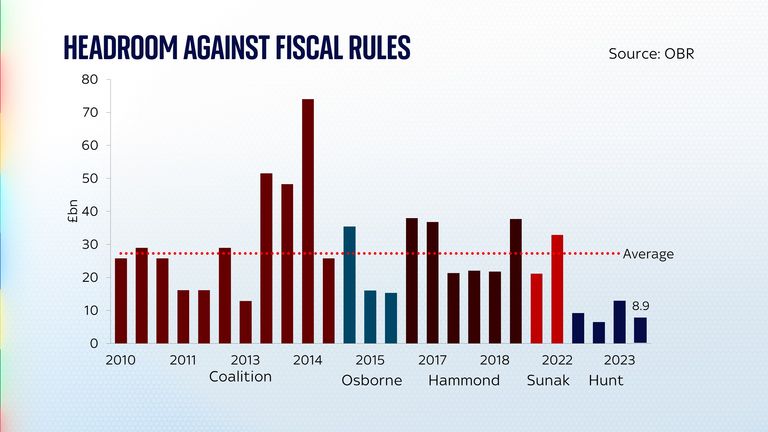Perhaps the most telling thing to say about this budget is that it was just… a little bit thin.
Indeed, in terms of its impact on the public finances, it was significantly smaller than the autumn statement.
Back in November, the chancellor delivered £20bn worth of tax cuts, roughly split between the 2p cut to national insurance and the introduction of “full expensing” on business investment.
Today’s budget was essentially half the size of the autumn statement, amounting to around £10bn of tax cuts – essentially a further national insurance cut and a few other bits and pieces.
The chancellor spent much of his speech calling this a “tax-cutting budget”, but this is not entirely accurate.
It’s certainly true that following the national insurance cut, overall levels of taxation in the UK will not rise as fast as they were expected to six months ago.
But they will still rise.
The main reason for that is that the government has frozen the threshold at which people begin to pay taxes, and pay the higher rates of taxes.
The upshot is that as you earn more (and with inflation so high, earnings are also going up quickly), you pay considerably more tax.
And while the cumulative 4p cut in national insurance (2p in November, 2p today) will help reduce the pain, it won’t completely compensate for it.
Consider: the impact of fiscal drag on the average household is roughly £1,500. Following the cuts in national insurance, that net “takeaway” will drop to about £700. It’s still in negative territory; people will still be paying more tax. But it’s less of a tax rise than before.
Read more:
How very inaccurate forecasts determine the amount spent on investment or tax cuts in budget
Why the lack of ambition? In large part because the chancellor appears to be determined to stick to his fiscal rules, and those fiscal rules give him only a sliver of room to spend extra money.
Back at the time of the autumn statement, the Office for Budget Responsibility put that amount of “headroom” at £13bn.
In the intervening period, the public finances actually deteriorated slightly, with the upshot that before the chancellor began to cut taxes at this budget, his headroom had dropped a little bit, to £12.2bn. So he simply didn’t have much room to spare.
In the event, he used up a chunk of that headroom, leaving him with £8.9bn.
One lesson is that if the numbers don’t change and if Jeremy Hunt remains determined not to bend or break his fiscal rules, he won’t have much money left to spend ahead of the election.
Some good news
Whether people are inspired by the chancellor’s rigidity on these rules remains to be seen. But there was at least some better news on the wider state of the economy from the OBR’s economic forecasts.
The official forecaster upgraded its projection for real household disposable income this year and next – suggesting the pain of the cost of living crisis is finally abating.
There is even a chance of the feelgood factor returning to the economy, especially if the Bank of England begins cutting interest rates soon.
Click to subscribe to the Sky News Daily wherever you get your podcasts
The question for the Conservative Party is whether that feelgood factor is reflected in the polls.
Either way, this fiscal event felt somewhat underwhelming. Not a big bang, but a quiet continuation of the policies the chancellor has been proposing for some time.
That, presumably, is the plan. Whether it will pay off is another question.
Source Agencies




